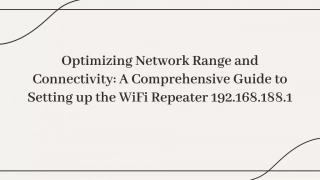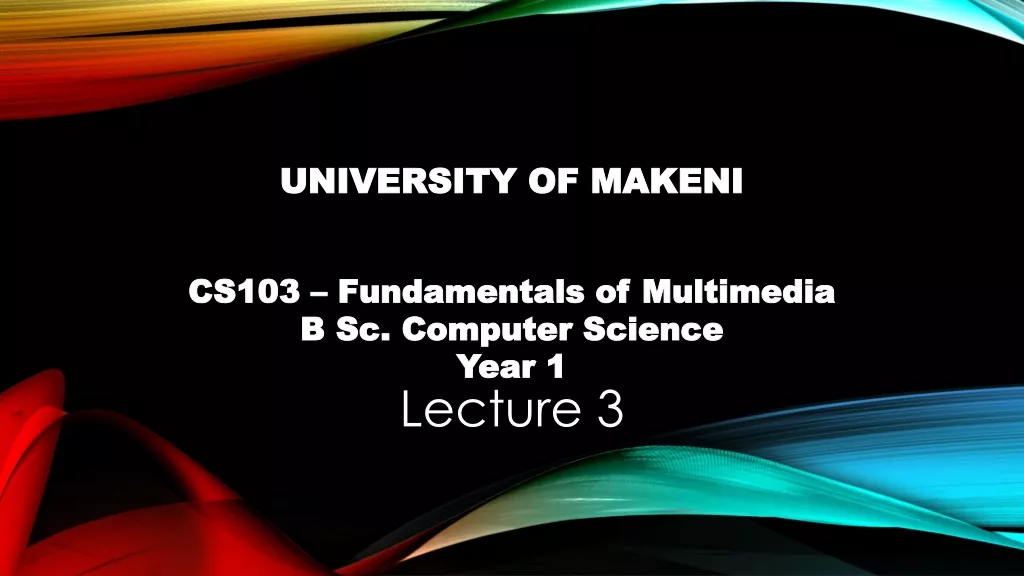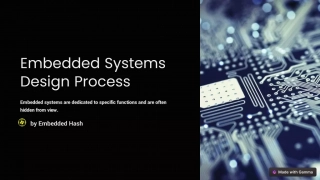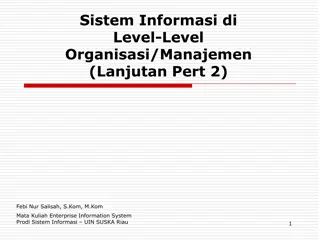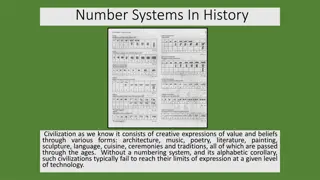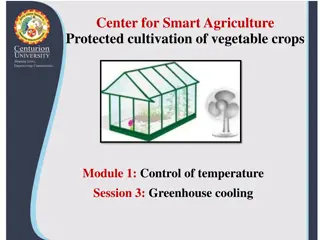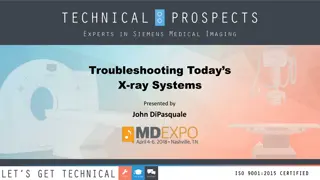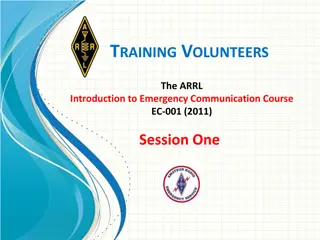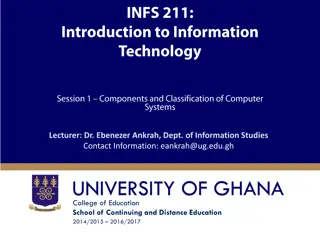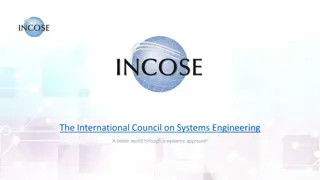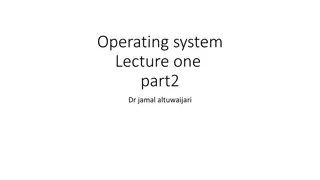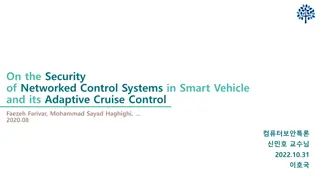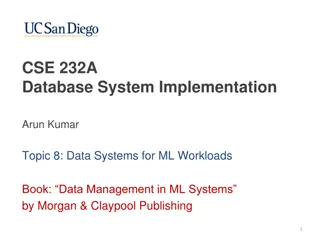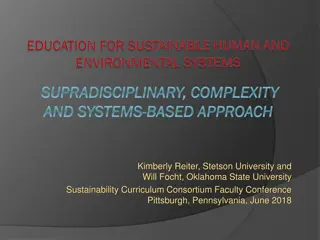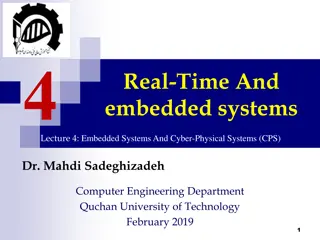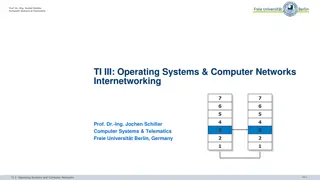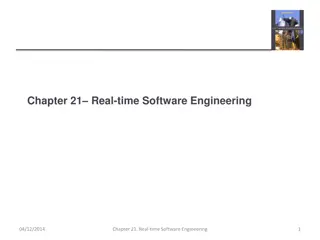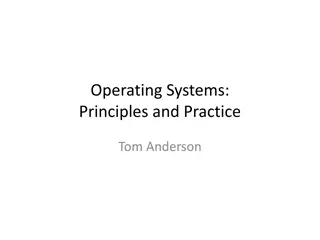Enhancing Food Systems for Improved Food Security and Job Creation
The importance of improving food systems to achieve sustainable development goals and enhance food security and job creation. It covers topics such as the current food systems, the impact of these systems, jobs in the food systems value chain, and key recommendations.
9 views • 24 slides
Boost Your Connectivity: Unleash the Power of WiFi Repeater 192.168.188.1 Setup
Boost your WiFi signal effortlessly with our user-friendly repeater that utilizes the 192.168.188.1 setup interface for quick and easy installation. No more frustrating dropped connections or slow internet speeds in certain areas. Our repeater extends your existing WiFi network, ensuring every corne
18 views • 9 slides
Multimedia Systems: Hardware and Software Components
Multimedia systems require specific hardware and software components to meet the demands of producing and playing multimedia content. Development systems are used for creating content with higher specifications, while playback systems are used for playing multimedia files with lower specifications.
9 views • 46 slides
Embedded Systems Design Process in the Embedded systems
Embedded systems are all around us, from the tiny microcontrollers in our household appliances to the sophisticated control systems in cars and aeroplanes. But how are these systems designed? Let's delve into the basics of the embedded systems design process in simple terms that anyone can understan
2 views • 9 slides
Overview of Distributed Systems: Characteristics, Classification, Computation, Communication, and Fault Models
Characterizing Distributed Systems: Multiple autonomous computers with CPUs, memory, storage, and I/O paths, interconnected geographically, shared state, global invariants. Classifying Distributed Systems: Based on synchrony, communication medium, fault models like crash and Byzantine failures. Comp
10 views • 126 slides
Operating Systems
An operating system is a crucial program that manages all other programs on a computer. It handles tasks like input recognition, file management, and device control. There are different types of operating systems such as single-user, single-task systems, multi-user, multi-task systems, real-time ope
6 views • 11 slides
Information Systems in Organizational Management
Management in organizations is divided into three levels: operational, tactical, and strategic. Each level requires different information systems to support various activities. Operational systems focus on routine transactions and control processes, while middle-level systems aid in semi-structured
10 views • 39 slides
Explore the Top 5 Trends in Alarm Systems with Shellharbour Security Systems
Explore the latest trends in alarm systems with Shellharbour Security Systems. Learn about advancements such as smart home integration, wireless technology, AI-powered monitoring, and more. Stay informed to enhance your home or business security with cutting-edge solutions. Visit: \/\/shellharbourse
7 views • 8 slides
Number Systems In History
Civilizations throughout history have expressed their values and beliefs through various creative forms like architecture, music, and literature. The development of numbering systems played a crucial role in advancing society's ability to communicate, track records, and engage in trade. From the ear
1 views • 17 slides
Introduction to Database Management System Explained
This presentation covers the basics of database management systems, including definitions of data, types of data, structured and unstructured data, storing data in computers using file systems and database systems, and issues with file systems like data redundancy, inconsistency, difficult data acce
3 views • 18 slides
Different Types of Recommender Systems
Recommender systems play a crucial role in providing personalized recommendations to users. This article delves into various types of recommender systems including Collaborative Filtering, Content-Based, Knowledge-Based, and Group Recommender Systems. Collaborative Filtering involves making predicti
1 views • 7 slides
Efficient Greenhouse Cooling Systems for Smart Agriculture
Active summer cooling systems like fan-and-pad and fog systems are crucial for maintaining optimal temperatures in greenhouses. These systems work by utilizing evaporation to remove heat from the air. Fan-and-pad cooling systems have been in use since 1954, where water is passed through pads to cool
1 views • 23 slides
National Mine Safety Week 2023 - Vehicle Safety Guidelines
Explore the comprehensive safety guidelines for vehicle operation during National Mine Safety Week 2023. Learn about maintaining safety equipment, cabin safety systems, visibility safety systems, operational safety systems, emergency safety systems, other safety systems, training responsibilities, a
3 views • 10 slides
Polymeric Controlled Drug Delivery Systems
Polymeric controlled drug delivery systems play a crucial role in regulating drug release through diffusion, solvent penetration, and chemical mechanisms. These systems include diffusion-controlled, solvent-controlled, and chemically-controlled devices, each operating based on specific principles. S
1 views • 33 slides
Troubleshooting Today's X-ray Systems by John DiPasquale
Gain insights into troubleshooting modern X-ray systems with a comprehensive guide presented by John DiPasquale. Explore X-ray system subsystems, including generator systems and imaging systems, with detailed explanations and visuals. Learn about the basics of generator systems, required circuits, a
2 views • 33 slides
Smart Antenna Systems Overview: Enhancing Wireless Performance
Smart antenna systems, like adaptive array antennas and switched beam antennas, combine antenna arrays with digital signal processing to transmit and receive signals adaptively. These systems improve signal quality, reduce interference, and increase capacity by dynamically adjusting radiation patter
0 views • 20 slides
Emergency Communication Systems for Volunteer Training
This content covers various topics related to emergency communication systems for volunteer training, including agency communication systems, government radio systems for police and fire departments, emergency medical radio systems, American Red Cross frequencies, and types of served-agency radio sy
2 views • 29 slides
Introduction to Embedded Systems Design
Embedded Systems Design, Chapter 1 provides an insightful overview of embedded systems, distinguishing them from general-purpose computers. The chapter delves into the characteristics of embedded systems, their design considerations, and the various types of embedded computers such as general-purpos
2 views • 7 slides
Introduction to Computer Systems: Components, Types, and Functions
This session conducted by Dr. Ebenezer Ankrah covers the essential aspects of computer systems, including hardware components, types of computer systems, and information systems. Students will gain an understanding of the fundamental principles and characteristics of computer systems, enabling them
0 views • 41 slides
International Council on Systems Engineering (INCOSE) - Empowering Systems Engineers
INCOSE is dedicated to promoting successful systems engineering practices worldwide. Systems engineers play a critical role in designing and managing complex systems, ensuring efficiency and innovation. Through a comprehensive approach, INCOSE aims to address societal and technical challenges, drivi
0 views • 30 slides
Evolution of Operating Systems over the Decades
Operating systems have evolved over the past 50 years through distinct phases, from the early history of primitive machines in the 1940s and 1950s to the development of batch processing systems in the 1960s and multimode time-sharing systems in the 1970s. The 1980s marked the era of personal computi
0 views • 24 slides
Overview of Manufacturing Systems: Types and Characteristics
Manufacturing systems are essential for transforming raw materials into finished products. This overview covers the types of manufacturing systems, such as job shops and flow shops, along with their characteristics, advantages, and disadvantages. It also introduces modern manufacturing systems like
1 views • 23 slides
Sustainable Evaluation Systems Workshop Summary
Workshop on Sustainable Evaluation Systems by Stephen Porter at the NEC Conference focused on defining evaluation systems, addressing their failures, and emphasizing the importance of quality, use, and networks in achieving sustainability. Participants engaged in activities such as bingo card introd
0 views • 38 slides
Principles of Satellite Communications in Engineering
Explore the history and fundamentals of satellite communications, including the evolution from the first artificial satellite, Sputnik, to modern active and passive satellite systems. Learn about communication via satellites as microwave repeater stations, bridging distances and optimizing frequenci
0 views • 13 slides
ATST Safety Review High-Level Software Overview
This document provides an overview of the high-level software components involved in the ATST Safety Review conducted on 26th January 2011. It includes details on the Telescope Software Control Systems, Observatory Software Control Systems, and Instrument Software Control Systems, along with respons
13 views • 15 slides
Nursing School Phase 2 and Spring 2021 Rankings Criteria
Details about the Phase 2 and Spring 2021 ranking timelines, selection criteria, registration deadlines, and repeater rankings for the School of Nursing. Requirements for TEAS scores, GPA, course repeats, and eligibility for the lottery are outlined. The process emphasizes academic excellence, prope
0 views • 13 slides
Economic Outdoor CPE/AP with 300Mbps Transmission - SY205
SY205 is a cost-effective outdoor CPE/AP designed for long-range WiFi coverage, supporting IEEE 802.11b/g/n standards with a 300Mbps data rate. Equipped with a Qualcomm QCA9531 chipset and 14dBi directional antenna, it offers a wireless distance of over 1KM. The device supports various modes, includ
0 views • 4 slides
COVE Repeater Association: Serving Amateur Operators in Central Texas
COVE Repeater Association serves Copperas Cove and operators across Coryell, Bell, Burnet, and Lampasas Counties. They offer various activities, monthly meetings, social events, and National Field Day events. The club operates VHF and UHF repeaters, with both analog and digital capabilities. Helpful
0 views • 8 slides
Security Analysis of Networked Control Systems in Smart Vehicles
This paper explores the security challenges faced by networked control systems in smart vehicles, focusing on adaptive cruise control technology. It discusses the vulnerabilities in cyber-physical systems, such as intrusion detection systems, and highlights the potential risks posed by cyber attacks
0 views • 21 slides
Information Systems in Organizations: Overview and Implementation
Information systems play a crucial role in organizations, encompassing transaction processing systems, functional area information systems, and enterprise resource planning systems. This content delves into the purpose of transaction processing systems, the support provided by information systems ac
2 views • 30 slides
Regulation and Supervision of Payment Systems in Peru
Peru has seen significant economic growth and stability from 2004 to 2013, enhancing confidence in the payment system. The Central Reserve Bank of Peru plays a crucial role in ensuring systemic stability, oversight, and efficiency in payment systems. Supervision is necessary to safeguard public obje
1 views • 24 slides
Data Systems for Machine Learning Workloads and Advanced Analytics
This content explores the intersection of database systems with machine learning workloads, covering topics such as big data systems, ML lifecycle tasks, popular forms of ML, and data management concerns in ML systems. It delves into the importance of ML systems for mathematically advanced data anal
1 views • 21 slides
Cascade Control Systems in Industrial Processes
Cascade control systems play a crucial role in improving process control efficiency by incorporating feedback loops within feedback loops. This type of control architecture helps to better handle disturbances and variations in the process by creating secondary loops that monitor specific parameters.
3 views • 8 slides
Sustainable Education for Human and Environmental Systems
Sustainable Education for Human and Environmental Systems (SHES) focuses on fostering sustainable societies through social learning and systems thinking. It aims to promote interconnectedness between human and environmental systems, with a vision of enhancing well-being while maintaining the viabili
0 views • 19 slides
Approval Workflow for NR Repeaters EMC Requirements
An electronic meeting was held to discuss the approval workflow for NR repeaters' EMC requirements. The meeting focused on core requirements for TDD and FDD NR repeater EMC, referencing CISPR or IEC specifications for various EMC requirements. Different options were considered for test conditions an
0 views • 6 slides
3GPP TSG-RAN WG4 Meeting #100-e Electronic Meeting Summary
The 3GPP TSG-RAN WG4 Meeting #100-e held discussions on defining EVM limits, modulation schemes, repeater requirements, and IMD requirements. Emphasis was placed on linking EVM levels to modulation schemes and declaring supported levels for repeaters. The meeting also addressed NF equivalent RF requ
1 views • 7 slides
Embedded Systems and Cyber-Physical Systems
Embedded systems are specialized computer systems embedded within larger systems, such as control systems and car controllers. This lecture covers real-time aspects, applications of Cyber-Physical Systems (CPS), and examples like the Boeing 777/Airbus A380 cockpit. It discusses the design process of
1 views • 22 slides
Overview of Prof. Dr.-Ing. Jochen Schiller's Operating Systems and Computer Networks Course
Prof. Dr.-Ing. Jochen Schiller teaches a course on Operating Systems and Computer Networks at Freie Universität Berlin, Germany. The course covers topics like Networked Computer & Internet, Host-to-Network communication, Transport Layer, Network Security, and more. Reasons for having multiple netwo
0 views • 40 slides
Real-time Software Engineering for Embedded Systems
Embedded systems play a crucial role in controlling various machines and processes. Real-time software engineering focuses on designing systems that respond instantly to events, ensuring correctness and timeliness. Characteristics like continuous operation, unpredictable environment interactions, an
0 views • 59 slides
Operating Systems: Principles and Practice in CSE Curriculum
Dive into the world of operating systems through the lens of "Operating Systems: Principles and Practice" by Tom Anderson. Discover how this course fits in the UW CSE curriculum, covering systems programming, operating system interfaces, and distributed systems. Explore the project work on building
0 views • 21 slides

